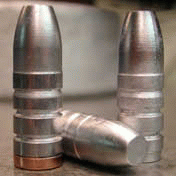One of Us
| Yes, you are correct.
Linotype at 22 Brinnel makes your nail slide |
| | | Posts: 13978 | Location: http://www.tarawaontheweb.org/tarawa2.jpg | Registered: 03 December 2008 |   IP
IP
|
|
One of Us
| If you do seriously do start casting then I recommend a Saeco hardness tester. |
| | | Posts: 4545 | Location: Austin,Texas | Registered: 08 April 2006 |   IP
IP
|
|
One of Us
| Buying a copy of the Lyman Cast Bullet Handbook would be money well spent... although they "trumpet" the use of their Lyman #2 alloy, which uses 5% tin (way too much), the book would give you several different recipes to start with. In my estimation, if you can find wheel weights they are about as good as it gets. Mixing something like linotype and pure lead works well for handguns. Pure lead is best left to muzzleloaders...
You are starting down a very rewarding path. Ask away; we are here to help! |
| | |
One of Us

| There is a great deal of very usefull information here http://www.lasc.us/CastBulletNotes.htmWelcome to the madness. From plinking to serious hunting,(1400 - 2400+ fps) I seldom shoot anything other than cast now, except for my little 20 cal varmint rifle. |
| | | Posts: 2694 | Location: South Otago New Zealand. | Registered: 08 February 2009 |   IP
IP
|
|
One of Us
| Lost Oki--I second the getting a Lyman Manual. When I was considering starting reloading I bought a Lyman Manual which also got me interested in casting. When I read the formula for Lyman alloy, I thought how could that be? You are using mostly wheelweights that are an unknown and adding very small precision amounts of a known and coming up with a precision blend. How do I know the wheelweights didn't already have these things? So I started using wheelweights and to me that's as good as it gets. When I started casting .22 cal I was told repeatedly you have to add tin to get good fill out. I bought some tin and couldn't tell any difference. I have never had a hardness tester. To me some try to make bullet casting rocket science--and it's not. |
| | | Posts: 3811 | Location: san angelo tx | Registered: 18 November 2009 |   IP
IP
|
|
One of Us
| Thanks for the replies and direction. Looks like my next steps are to find a Lyman Cast bullet handbook at the gun show this weekend and find me a .54 round ball mold. I have previously purchased some cast bullets for my 35 Whelen from a guy in Alaska. A lot of support from him and he was right on the money. Book should get me started. |
| | | Posts: 253 | Location: Texas by way of NC, Indiana, Ark, LA, OKLA | Registered: 23 January 2005 |   IP
IP
|
|
One of Us
| Lost Oki--Lyman has both a regular manual and a Cast Bullet manual. Both manuals have information about casting and cast bullet reloading data. Their regular manual has jacketed loading data as well. If you also shoot jacketed, I'd get their regular manual--not the Cast Bullet. That is not to say that anything wrong with the Cast Bulet manual--it is more expanded in the cast data area. |
| | | Posts: 3811 | Location: san angelo tx | Registered: 18 November 2009 |   IP
IP
|
|
One of Us
| Thanks carpetman1, I will check out both books and then back to this forum for some followup questions. |
| | | Posts: 253 | Location: Texas by way of NC, Indiana, Ark, LA, OKLA | Registered: 23 January 2005 |   IP
IP
|
|
one of us
| If you drop the lead ingots on cement you will hear a ring with hard lead. Butter soft lead will thunk. After you have heard it for a while there will be degrees of ring.
I own a Cabine tree tester. In my opinion it is the best tester bar none. Ron |
| | | Posts: 987 | Location: Southern Idaho | Registered: 24 March 2002 |   IP
IP
|
|


 The Accurate Reloading Forums
The Accurate Reloading Forums  THE ACCURATE RELOADING.COM FORUMS
THE ACCURATE RELOADING.COM FORUMS  Guns, Politics, Gunsmithing & Reloading
Guns, Politics, Gunsmithing & Reloading  Cast Bullets
Cast Bullets  identifying lead hardnes
identifying lead hardnes








